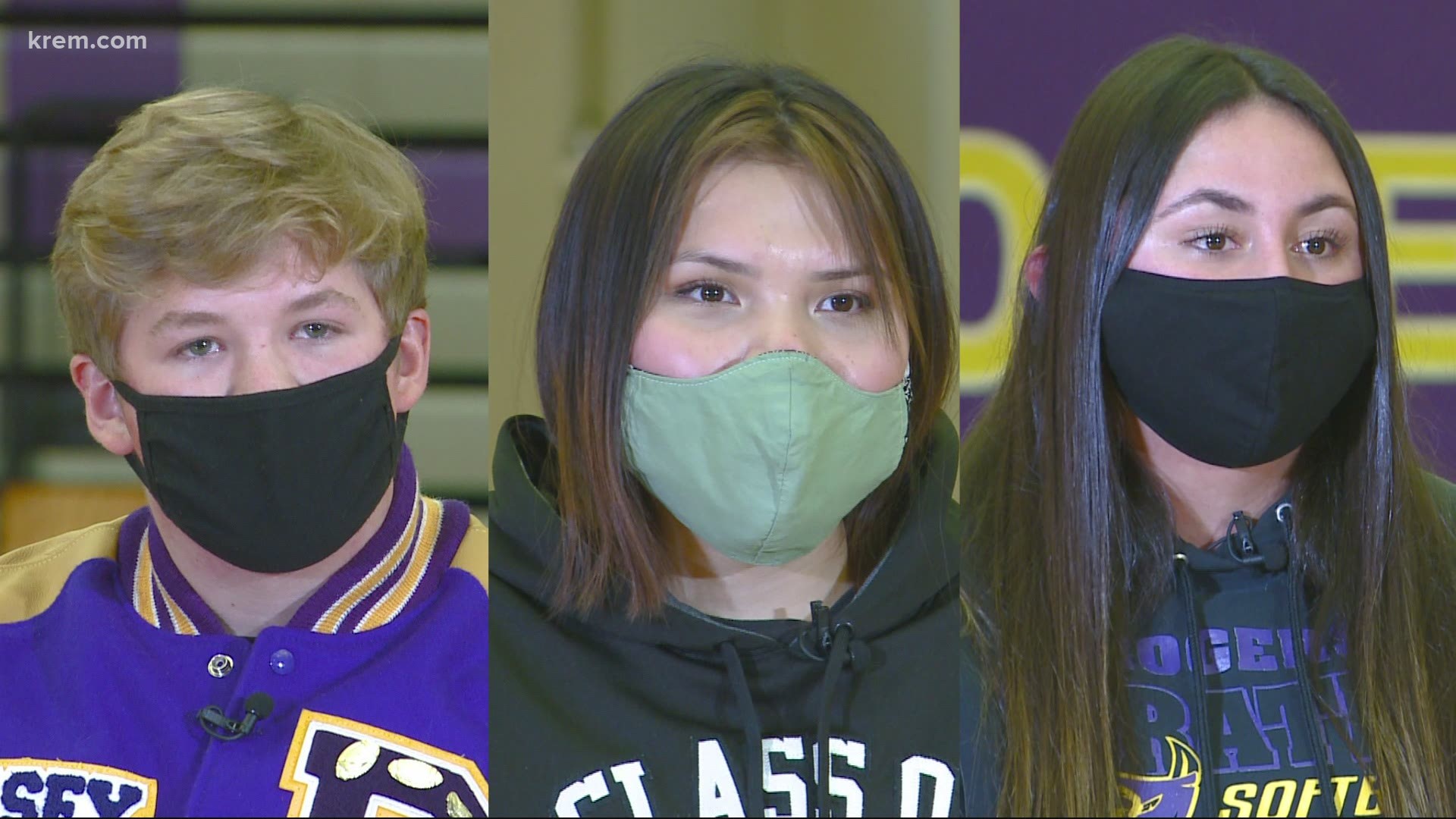SPOKANE, Wash. — The COVID-19 pandemic has forced changes on so many activities for kids and teens. Now, delayed high school athletic seasons could end up costing some students a shot at a college scholarship.
Despite their years of effort and dedication, it simply may not be enough to overcome the challenges.
KREM 2 sat down with a trio of seniors from Rogers High School in Spokane to hear firsthand how the coronavirus has impacted their next steps.
Casey Jeske plays quarterback on the football team. Jaelynn Proctor plays catcher and third base for slowpitch and fastpitch softball. Dyani Sijohn Pascal plays for the girls basketball team.
Together, they share many of the same concerns about where sports will take them next.
"I was working so hard for my senior season," Sijohn Pascal said. "And then it's just cut off."
"It was just hard because you can't go out and connect with your teammates," Jeske said.
Proctor told KREM 2 she had multiple college visits scheduled when COVID-19 hit in 2020.
"When we went into lockdown, all of my visitations were cancelled. It's frustrating," Proctor said. "Because that's how I rely on getting my name out there, and getting coaches to come and see me, is for them to come watch me play. Or attend their camps. And not being able to do that, it sets me back from other people who have already gotten to do that. "
Since COVID-19 hit, more than 30 states have delayed or cancelled high school sports seasons. Here in Washington, the Washington Interscholastic Activities Association, which oversees high school athletics, said this year's fall, winter and spring sports will likely take place starting mid-February in shortened, modified seasons.
So far, the Great Spokane League has announced Season 1 will start on Feb. 8, and will include staggered starts for volleyball, swimming, football, soccer and cross country. But, it all hinges on COVID activity in our region, and these students know they're running out of time.
"I know what I'm capable of with football, and how I play football, that I know I can go to the next level," Jeske said. "So, I just try to use that as motivation."
Motivation is key to try and stay competitive. Many teens are learning they now have to train and promote themselves, oftentimes turning to social media and sport-specific apps to get a recruiter's attention.
It's something Eastern Washington University Recruiting Coordinator Marc Anderson sees almost daily.
"I could tweet 'Happy Birthday' to my wife, and there would be links to highlight film. It's nuts," he said.
But, he also understands.
"I don't really blame them either. I respect them for putting themselves out there," Anderson said.
While these athletes may eventually get their senior season later this year, many colleges will already be done recruiting by the time they get to play.
The harsh reality is some student athletes may miss out on a scholarship opportunity.
"Yeah, I was hoping that my senior season would be an opportunity to get exposure to colleges, because I really wanted to play," Sijohn Pasal said. "But now it's just iffy. I just don't know."
Season delays are only part of the problem. In many cases, wealthier families could pay for better opportunities for their kids. For example, while high school basketball games were cancelled across the entire state of Washington, club tournaments continued out-of-state almost every weekend throughout the winter.
So, for those who could afford regular trips to Boise, Salt Lake, Phoenix and Las Vegas, chances for exposure and recruitment were there, just not for everybody.
"There's a gap there because the kids that are able to afford to go to tournaments every weekend, they get more opportunities than those who can't afford to do it," Sijohn Pascal said.
She told KREM she attended one basketball tournament this past summer in Idaho, but she worries it wasn't enough.
"It was hard because they've only seen me at my one tournament," she said. "I feel like it didn't really showcase my best game ever. And it would have been different if it was my senior season and I'd been practicing for months."
She said scholarships are going to be her best way to pay for a college education, so she's shifting her focus away from a sports altogether.
"I'm mostly relying on academics right now," she said. "I don't think I should rely on sports, since we probably won't even have a season. So, might as well just focus on academics."
According to the NCAA, almost 200,000 students a year help finance their college education through sports scholarships. But with college players getting an extra year of eligibility because of COVID-19, by this upcoming fall, there simply won't be as many spots to fill.
"I'm sitting here now, my senior year, scratching to find a team to play for," Proctor said.
Jeske admitted he worries about that too.
"But you just got to go in there like you're going to go win that job, like you're going to be that person that coach calls for that spot," Jeske said. "And you just have to keep working for that, no matter how many guys are ahead of you."
Have a tip for the KREM 2 Investigative Team? Email us at investigators@krem.com

